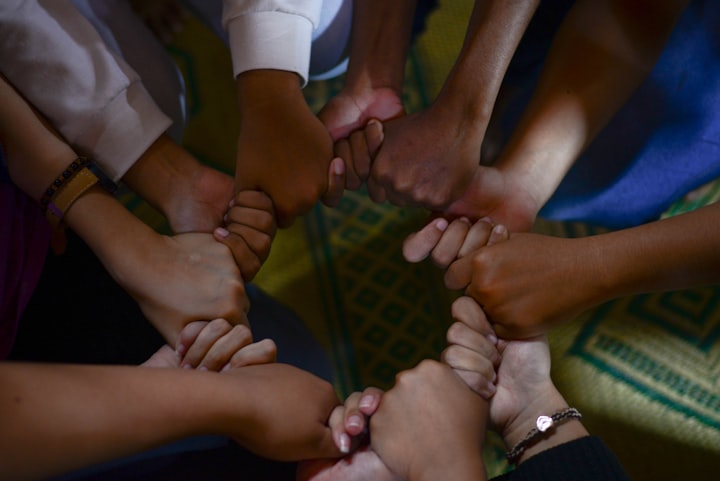Finishing the Fight with Bulimia
Tackling the Last Few Obstacles

Two years ago, I wouldn't be voluntarily sitting in a coffee shop like I am now. Heck, I would be trying every move possible to not have to go to a coffee shop. And then, just for considering eating food—my goodness, the idea of it, I would need to go for a run. I couldn't go to the gym to work out, because when I started exercising, I couldn't stop again until my body made me. I either passed out, or was too weak to stand. My diet consisted of a maximum of three hundred calories per day or less. I could eat nothing all day, and still be angry and upset at myself. I exercised until my body was falling apart, starved until I was freezing no matter how many layers I wore, and lacking energy to the point where I could barely leave bed.
And that was just the restricting side of it.
Eventually, thanks to my bulimic tendencies, I would break. Suddenly, my body ripped the steering wheel from the hands of my unwell mind and took over. I would eat,
And eat,
And eat.
Uncontrollably. I wouldn't be able to stop until I struggled to breathe or move I was so full of food. The guilt would be unbearable, and the disappointment in my "weakness." The next hour would be spent with my fingers down my throat and my head down a toilet. And I would push my body until I could see blood in the ceramic bowl. My mind, so broken and warped through social media and other situations, still believed I should continue to vomit food- despite the risk of death through a torn oesophagus. Because, after all, food was bad.
I couldn't think.
I couldn't laugh.
I couldn't exercise.
I couldn't socialise.
I couldn't be happy.
The only twisted relief I could manage to experience came through my weekly weigh-in at the eating disorder clinic, when I lost weight. Might I just emphasiza, it was relief. Not fulfilment, not happiness, not a solution to the illness or my pain.
Never did my illness only hurt myself, but it also tore huge gaps in the relationships I had around me. My family, their hearts broke when I refused food. They would sit through meals, trying to coax me kindly to eat. I could see the desperation and fear in their eyes, but my overwhelming fear of weight gain always came first.
It always came first—in every aspect of my life, its roots dug in deep and made it seem so impossible to reverse. It was as though it held me together somehow. Food was all I thought about, this was my identity.
To sit here, four, nearly five years on from when everything began tumbling downhill and see the journey I have been through, it's overwhelming. I can tell you one thing: I was thoroughly convinced, both inside and out, that I would never recover from this.
And I just ordered the most massive chocolate caramel brownie square. Guiltlessly.
The healing was slow at the start. The entire two years I spent in counselling, I didn't feel like I had progressed at all—but I had, with no realisation because my mind and heart still hurt the same. Physical tendencies and bad habits slowed down before I realised.
Next, my mentality was slowly changing. Sometimes, I found it too difficult. How could I ever allow myself to eat a slice of cake and tell myself to enjoy it? How could I feel like I deserve that, and it's OK to treat myself from time to time? That it's OK to carry weight?
I found the most effective way to combat this was to treat myself how I would treat other people—it's reverse order, I know, but sometimes the people we treat the worst are actually ourselves. I wouldn't think someone else deserved punishment for eating. I thought my curvy friends looked beautiful. So I would tell myself that I do deserve to eat, even if I didn't believe it. Live like the facts are true, until your brain believes it.
I think another thing that started smashing up the bulimia was saying to myself, "It's OK." Because it is. It's food, not the end of the world. When I overate, or binged, I told myself that it was alright, rather than being sick and running for the rest of the day. By doing the latter, I would set myself up for a repeat of the torment I had just been through. To walk away, accepting that we all slip up and moving on, healed me in ways I can't describe.
The final breakdown was a recent discovery. I needed to stop focussing on the wrong numbers. I was obsessed—no, obsessed doesn't even cover it—severely fixated on calories and weight.
I weighed myself several times a day.
I knew the calories in everything, exactly.
I weighed my food.
I counted calories.
I literally used calculators and google at every meal, and every workout. Now, my focus is changed. I'm a person who needs goals—things to work towards, but they need to be healthy. Now, I don't focus on these numbers, I focus on strength. Instead of defining myself by how many stone and pounds I weighed, I calculated my health by how much I could push, pull, run, stretch, and so forth.
When I focused on calories and weight loss, I may have been at what NHS calls a 'healthy weight' online, but NHS never said it was still healthy if your hair was falling out and you couldn't stay awake while sitting on that number. Although it could be healthy if I treated my body right, I didn't. I now weigh a stone more than I did back then, but I still weigh within the category of a healthy person. And I am strong—very strong. I have built a lot of muscle, and unashamedly a little fat, but my body is in better shape than it ever was. My goals changed from being a stick thin, model-like girl, to being a girl who smashes goals and personal records with no way to go but up. Instead of aiming for weaker, I'm aiming for stronger. Over the summer, I'm working on hitting a 100 KG squat, amongst other goals. I give my muscles the energy they need for this, and the food that will help my body to grow, adapt and repair.
I feel amazing, and the best part? I know that I'm healthy, because my body is capable. I improve, and I progress constantly, and I have goals which are safe and smart. I love fitness, but now, I don't use it for the wrong reasons.
From time to time, my brain still accidentally diverts to old thoughts and tendencies, and I can overeat on occasion from habit. It's understandable, because I'm newly recovered, but by fighting it with the simple "It's OK," everything changes. What's more, it means when I go to the gym, I have more energy for an effective workout.
Very, very lastly—don't believe your brain. Body dysmorphia could send you back miles. Some days we feel good about ourselves, some days we don't. On the bad days, don't listen to yourself. Your brain could be manipulating you and you have no idea. Keep your calculations solely determined by your health, by how much you can lift at the gym, or how far you can run, not by the morning you decided you were an ogre for no particular reason, and put you back a month in your recovery.
So if you are struggling to move on from an eating disorder, those are my four main points for tackling it once and for all.
- Treat yourself how you would treat others. You. Are. Deserving.
- "It's OK."
- Focus on being strong, not weak and light.
- Your brain is wrong.
Overall, Honey, just keep going. You will get there, I promise, and my goodness, it will be the most incredible, freeing moment in your life when you realise you've done it.
Persevere.






Comments
There are no comments for this story
Be the first to respond and start the conversation.